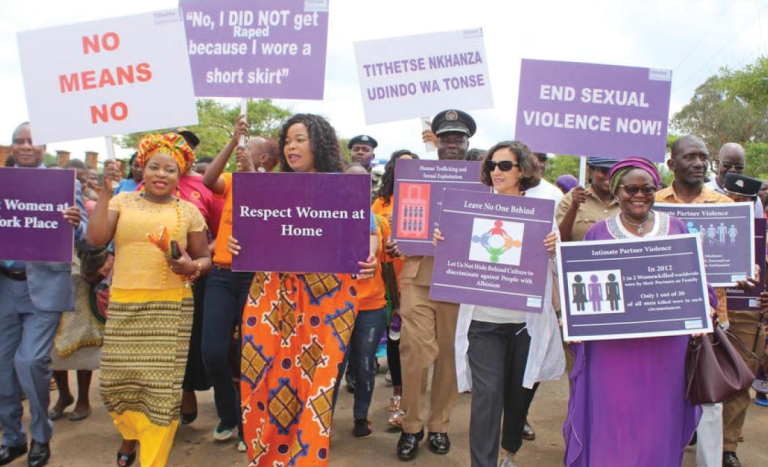Workplace sexual harassment persists
Upon joining a new workplace, many recruits look up to their bosses as top professionals to emulate.
In their excitement, they appear eager to learn a trick or two from the men in power.

However, some incomers soon discover that the influential men in power are just sexual monsters in businessuits. They make sexually sensitive comments on a woman’s looks and dressing, even scratching her hand during handshakes and, in extreme cases, touching her sensitive parts during meetings.
Some report the unbecoming behaviour so the overreaching bosses could be disciplined, but many suffer in silence.
Many women workers in Malawi experience various forms of sexual harassment in their workplaces, but seldom speak up or stand up against their abusers.
A survivor renamed Chisomo warns: “Speak up because silence fuels the malpractices and encourages perpetrators to continue harassing women.”
#MeToo, the global name-and-shame campaign, has lifted the lid on how some men abuse their decision-making positions to sexually exploit women workmates.
In Malawi, former Malawi Broadcasting Corporation (MBC) director-general Aubrey Sumbuleta is being tried for sexual abuse of women staff during his tenure at the State broadcaster.
Malawi Police Service ex-commissioner responsible for human resource management Stanley Kaliza also stands accused of similar abuses against some policewomen.
While some survivors boldly call out abusive men, many fear a backlash. Blaming the victims is a common reaction in the country, where one in five women experience sexual violence before turning 18.
Malawi Congress of Trade Unions (MCTU) says sexual harassment could be on the rise in workplaces. The umbrella body for trade unions received 700 work-related cases from January to October this year, but half were related to sexual harassment.
“This is 150 cases higher than reported within the same period last year,” it reports.
Malawi Human Rights Commission (MHRC) has developed a model workplace policy to end sexual harassment in both public and private institutions.
MHRC executive secretary Habiba Osman says sexual harassment in the world of work erode women’s productivity, social relations and mental well-being.
She says: “Sexual harassment is a big problem, but most women do not report it due to a culture of silence, stereotypes and other socio-economic factors. Others have normalised it.
“Let us do more to speak and act against sexual harassment. Different stakeholders need to create more public awareness, condemning the acts and providing an enabling environment for workers to speak up.”
Osman says sexual harassment causes stress, anxiety and depression, leading to mental health problems, withdrawal from social settings, loss of confidence, self-esteem, low productivity and failure to concentrate on work.
The toxic treatment of women workers as sex objects also disrupts family relations.
Osman says more needs to be done and stakeholders should work together to create safe and decent workplaces for women in line with the Gender Equality Act and labour laws.
Apart from popularising the model sexual harassment policy for greater adoption and use, MHRC investigated 23 cases of sexual violence and harassment from January to April this year. A dozen has since been concluded.
MHRC also offers GBV survivors free psychosocial services in partnership with Trust Psychosocial Services.
“This is in addition to the psycho-social services provided by the Social Welfare Department in the Ministry of Gender, Community Development and Social Welfare,” Osman says.
Employers Consultative Association of Malawi (Ecam) is worried with increasing cases though many go unreported.
Ecam executive director George Khaki says the multi-faceted problem negatively affect staff morale, productivity and profitability.
“Court cases arising from sexual harassment not only dent our corporate images, but are also costly in terms of litigation costs,” he says.
The employers’ body is carrying out a gender audit in workplaces with technical and financial support from the Investment Climate Reform Facility.
“The findings will expose the extent of sexual harassment in the workplace and guide Ecam’s actions to address the problem,” Khaki explains.
He says the Gender Equality Act in 2013 puts the country on the right track to tackle sexual harassment, but urges government to ratify the International Labour Organisation Convention No. 190 on Violence and Harassment in the Workplace. The global agreement lists progressive steps to curbing the vice.
MCTU secretary-general Madalitso Njolomole says: “Sexual harassment is a huge problem in many workplaces, with 50 to 100 percent cases in some organisations being related to sexual harassment against women and girls, including interns.”
He advises workers to reject sexual harassment, report it and blow the whistle.
For him, reporting suspects to police, courts, Ministry of Labour and other relevant authorities is pivotal to holding perverts to account for others learn from them.
Following the leaking of suggestive videos and conversations that led to Kaliza case currently underway in court, the Police service has acknowledged that some policewomen have been suffering in silence.
National police spokesperson Peter Kalaya said they investigate all reported cases and bring perpetrators to justice. However, he could not say how many have been brought to book.
He said: “Working with other stakeholders, we provide the required assistance to the victims, investigating the cases and prosecuting the offenders, to ensure that justice is served.
“The only challenge is that most victims suffer in silence often because they are shy or afraid that people will look at them with ridicule. Some fear that they might lose the case and look silly,” he said. Kalaya calls for more awareness campaigns to help workers understand sexual harassment, its dangers and how to report it.





